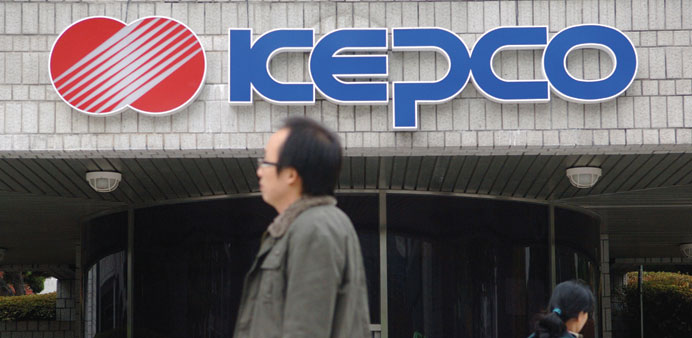Pedestrians pass in front of Kepco headquarters in Seoul. South Korea’s state-run energy firms have come under heavy pressure from the country’s new government to shed assets and pay off debt by 2017.
Reuters/Seoul
Plans by South Korea’s state-run energy firms to sell billions of dollars of overseas assets include the possible sale of stakes in Iraq’s Akkas gas field, Australia’s Bylong thermal coal fields and Canadian uranium firm Denison Mines, company sources said.
Korea Gas Corp (Kogas), Korea Electric Power Corp (Kepco) and Korea National Oil Corp (Knoc) have come under heavy pressure from the country’s new government to shed assets and pay off debt by 2017.
All three have submitted plans to the government to dispose of assets and are currently awaiting approval, the sources said. They declined to be identified as the plans were not meant to be public.
Kogas is considering selling 49% of its fully owned Akkas gas field in Iraq for 309bn won ($287mn) although it intends to retain operating control, local media Yonhap reported.
A source at the company said that selling part of its holdings in the gas field was possible. Kogas, the world’s top corporate buyer of liquefied natural gas, signed a deal in 2011 to develop the Akkas gas field in the western province of Anbar, Iraq’s largest with reserves of 5.6tn cubic feet.
Kepco may sell a stake in its fully owned Bylong thermal coal fields in Australia, and part or all of its 9.45% stake in Canadian uranium firm Denison Mines, a company source said.
According to a government statement released on Sunday, Kepco wants to raise 1.5tn won through asset sales by 2017. Further details were not immediately available. Knoc is aiming to raise $2.4bn by 2017, after raising $1.3bn by restructuring some of its overseas assets including the sale of some assets owned by its Canadian energy unit Harvest Operations, a company source said. Asia’s fourth-largest economy imports almost all of its oil and gas. It rapidly expanded overseas investments between 2008 and 2012 to boost oil and gas supplies from overseas reserves in a bid to curb inflation led by costlier energy imports.

